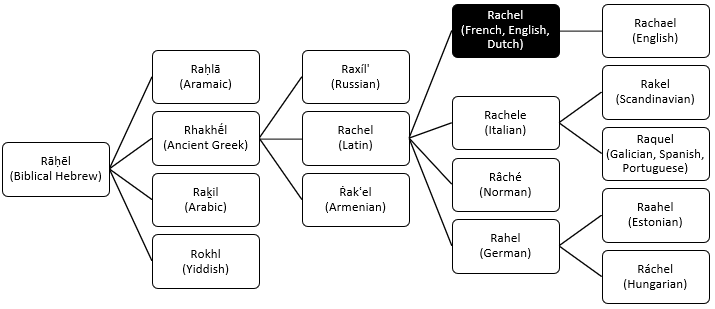
Rachel, your name is really cool! It means “ewe” in Hebrew.
Sindarin
Sindarin doesn’t have a word for “sheep.” We have two options here:
- Use a less precise word for an animal: Lavan.
- Coin a new word, based on the Quenya word and the ancient root it was based on, √MBĀ. Tolkien wrote that the root was repeated and became the word Máma in Quenya. If we take this ancient root through Sindarin’s phonetic history to make a cognate, we end up with mbābā > mbāva > mbǭv > bauv > *baw. (We start with mbābā because Tolkien listed it as a way that the duplication could end up, then showed Quenya would have started with mbāmā Even if we start with mbāmā or just mbā, we end up with the same word in Sindarin: *Baw.)
Some people don’t like this result, because *Baw is a homophone with two other possible meanings: the exclamation “DON’T!” and “wolf’s howl,” the latter being particularly irksome. The other theory is that the duplication of the root would go something like this: mbāmbā > mbamba > mbamb > bamb > *bam, though we don’t have much evidence for mbāmbā being the starting point. I will show names with both.
Put all these options together with a feminine name suffix, and you get: Lavaneth, Baweth, and Bammeth.
After all that work, when it comes to making it a name for your Middle-earth characters, we have to throw this all out. Well, kinda. We’ll keep the fanmade words for “sheep” because we’ll need those. Elves don’t name themselves after random things without indicating in the name either their connection to the thing or how they are like the thing. Think of Thranduil, who is named after the river flowing through his kingdom. Instead of the river’s name or just “river,” his name is “vigorous spring.”
I grew up on a sheep ranch in Montana, and I’m quite familiar with the character of sheep. They’re fierce. Ewes are even fiercer. They know that they’re prey animals, so they are hardwired to fuck you up if they feel threatened by you. It’s not just the rams that headbutt either – I’ve had a few near-misses with angry ewes whom I only escaped because there was a fence nearby to hop on. So, when I call an ewe “fierce” it’s not a joke. That said, sheep can be really sweet too, since they’re highly social like us humans are. And loud. They can be really, really loud.
Fierce Sheep: Bovregol or Bambregol
Sweet/Loving Sheep: Bovelui or Bammelui
Watchful/Vigilant Sheep: Bodirweg or Bamdirweg
Loud Sheep: Bruimo/Bovrui or Bruimam/Bambrui.
Quenya
Translating this will be fairly straightforward. We’ll take the Quenya word for “sheep – Máma” and add a feminine name suffix, to make Máme.
As a name for an elf, this doesn’t work. Elves don’t take names of random creatures. Instead, it’ll be a compound name that tells you how the person is like an ewe.
“Wild/Excited Ewe” Waldamáme (Valdamáme in Exilic Quenya)
“Affectionate Ewe” Mélamáme
“Watchful/Vigilant Ewe” Tirítemáme
“Warm Ewe” Laucamáme
![]()
Rachel, I hope that you found this article interesting and useful!
If you’d like your name translated in this series, comment below and I’ll consider it for a future article!
Source:
Hanks, Patrick & Hodges, Flavia. A Dictionary of First Names Oxford University Press. 1990. pg 274.
Wictionary, “רחל” Last Edited: January 8th, 2022.

I would love it if you could do my husband Philipp since he is just as much of a Tolkien fan as I am
It would be amazing if you could do the name “Lorelle” :)
Could you do my son Donovan?
Would love to know what Marshall would be!
My name is Haneen. It means Nostalgia, Longing, Yearning, Pinning or Desire in Arabic. Would love to know my name’s translation in Elvish.